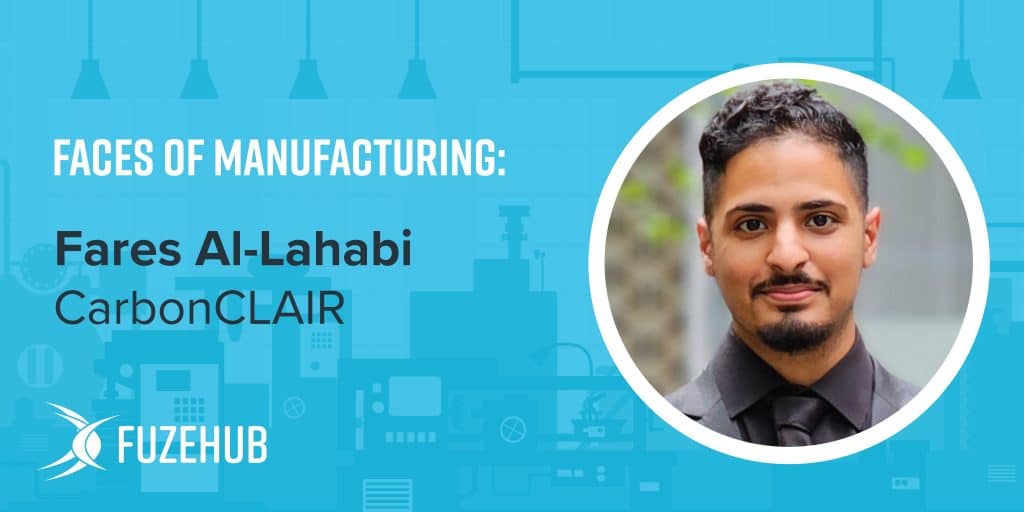Meet CarbonCLAIR
CarbonCLAIR is an environmental technology startup based at City College of New York. Its trio of undergraduate founders is developing an energy-efficient, mobile air purification and carbon capture system designed to promote sustainable air quality at construction sites and other hard-to-access settings.
“Our mission was to find a solution to improve air quality in urban areas,” said Fares Al-Lahabi, co-founder of CarbonCLAIR. “The ultimate vision now is to be a very strong name in sustainable construction.”
Student project
Al-Lahabi, now a Civil Engineering student at Manhattan University, met his partners, Elsa Cojab and Nazarena Soria Hadad, in the fall of 2023 when the three were engaged in an apprenticeship program through the City College Initiative to Promote Academic Success in STEM (CIPASS). Their team, which Al-Lahabi led, was charged with identifying a problem and building a prototype solution.
“One street in Harlem is called asthma street because of how poor the air quality is,” Al-Lahabi said. “We wanted to build a solution to that.”
The team also recognized the need to provide an economic incentive for people to use their air filtration device, so they added carbon capture. The CarbonCLAIR Mobile unit collects particulate matter and carbon dioxide emissions in real-time, processing 1100 cubic feet per minute while using only 130 watts of electricity.
“It doesn’t need to be connected to any power grid,” Al-Lahabi said. “The system is so energy efficient it can be run on solar.”
As a result, CarbonCLAIR can be used just about anywhere.
Getting the ball rolling
The success of the CarbonCLAIR prototype showed Al-Lahabi, Cojab, and Hadad just how much commercial potential their device had and set them on the path for a busy and productive 2024 during which they availed themselves of every resource they could.
“The New York State ecosystem for research and development is really strong,” Al-Lahabi said. “It is definitely a factor in how we reached where we are right now. Programs like I-Corps and the Zahn Innovation Center set you up. They make you do customer discovery, they strengthen your business model and so forth. Once you go through that, the ball gets rolling.”
The customer discovery process led Al-Lahabi and his partners to some key contacts, including Mount Sinai Hospital and PurpleAir Inc., a Utah-based purveyor of air quality sensors.
Mount Sinai and CarbonCLAIR are collaborating on a $35,000 pilot program, funded by a National Institutes of Health P-30 grant, to use the CarbonCLAIR mobile unit and air sensors to monitor air quality at 27 households during the construction of a bus depot in Jamaica, Queens. PurpleAir did its part by gifting CarbonCLAIR $3,000 worth of sensors.
Meanwhile, the team was entering and winning competitions and forging ahead with its R&D. In November, one year after creating their mobile unit, they presented the latest version at the FuzeHub-sponsored New York State Innovation Summit.
Preparing to graduate
As 2024 drew to a close, CarbonCLAIR applied for several initiatives, and so far, has enrolled in seven of them, including the national I-Corps and programs aimed at scaling and commercializing technology.
The company has been nominated for New York City EDC Founders’ Fellowship, which could mean a year of free lab space at a new lab in Brooklyn. In addition, CarbonClair has been asked to submit a proposal as a finalist for a $30,000 pilot project on Governor’s Island.
“The hope is that by the end of 2025 we will have launched two pilot programs and collected data from these,” Al-Lahabi said.
The company then plans to return to the Innovation Summit—this time as a participant in the Commercialization Competition. Al-Lahabi said the many conversations he has had with folks at FuzeHub have given him the knowledge and confidence to keep going.
These conversations also helped him make a decision. He will graduate from Manhattan University in May 2026, and will then devote himself to CarbonCLAIR full time.
“And from there we take it further and fly.”

